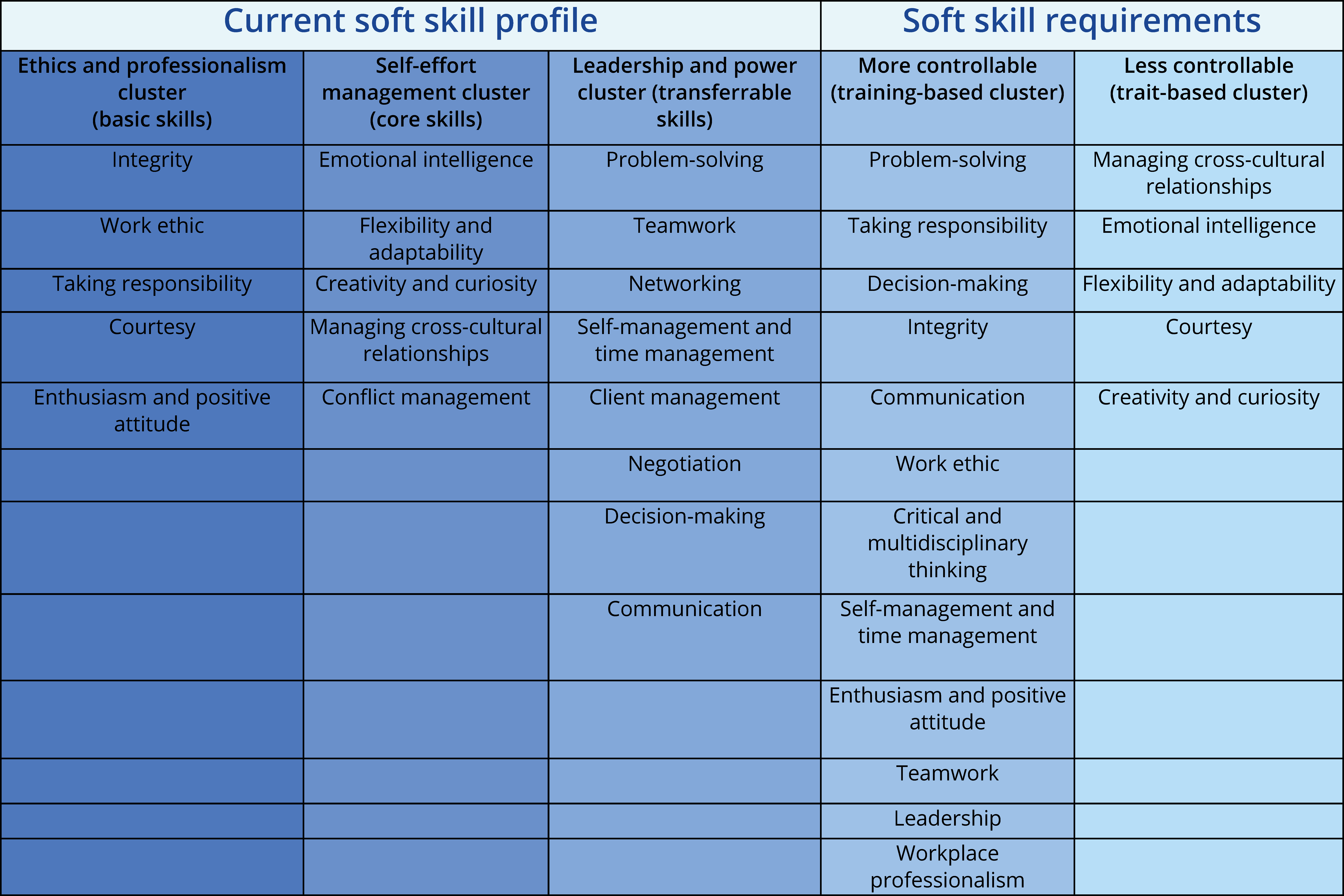
The construction industry urgently needs to understand how to improve staff retention. Yet although soft skills are essential to employability and retention alike, they have historically been classified as add-ons rather than as essential for the building sector.
The main problem is identifying and measuring these soft skills. It has always been difficult to distinguish the skills that are required – and which of them industry professionals actually possess.
Construction struggles with retention
To compete in the international market, a construction professional requires practical experience, various hard and soft skills and specific personality traits, some of which are seldom found in other sectors.
But employers have an ever-increasing need for such professionals, so it is important for the global construction industry, and especially private enterprises, to retain these critical skills.
As described in Project management: A multi-disciplinary approach, there is a so-called war for talent in global markets, meaning that high-performance teams cannot be built instantly.
Selecting and investing in more suitable professionals can therefore reduce the probability of skills being lost over time. Improving systems and processes and adopting new technology will to some extent be pointless if construction enterprises do not invest in their intellectual capital.
Even worse, a construction enterprise can invest in training and development only for a professional to leave the industry and apply their knowledge and skills elsewhere. As a result, the chasm between soft skills required and available for critical roles is rapidly widening.
The School of Built Environment at New Zealand's Massey University therefore carried out a study of the soft skills that the construction sector needs and possesses, with support from RICS; the research was recently published in the academic journal Buildings.
Profession surveyed on identified soft skills
Researchers asked for feedback from construction professionals practising in the Asia Pacific, Middle East and Africa regions.
A review of previously published research defined 23 soft skills for inclusion in the survey, the main research question for which was how the current skills profile of global construction differs from the requirements identified by industry experts.
Primary data was collected using a mix of qualitative and quantitative approaches. The survey consisted of 12 questions in three parts: part A collected demographic data, part B was more research-specific, and part C included open-ended questions.
Answers were subject to principal component factor analysis (PCFA), to identify influences on the specified soft skills and reduce the number of variables for further analysis.
More than 700 respondents provided feedback; these included directors, quantity surveyors, project managers, planning engineers, facility managers, senior valuers, land surveyors, business developers, and contract and commercial managers in construction.
Analysis of the survey feedback grouped the construction experts' current soft skill profile into three sets while those required were grouped into two, as shown in Table 1.
Table 1: The clustering of soft skills profile and requirements, based on PCFA

Possessed skills divided into three clusters
As Table 1 shows, the key factors underlying the current soft skills possessed were divided into three clusters:
- ethics and professionalism
- self-effort management, covering personal and organisational competencies
- management–leadership and power.
Soft skills such as integrity, work ethic, responsibility, courtesy, workplace professionalism, and enthusiasm and a positive attitude were grouped together in the ethics and professionalism cluster.
The self-effort management cluster meanwhile includes managing cross-cultural relationships, conflict management and emotional intelligence.
These skills were found to be important in maintaining, enhancing and managing individual and organisational relations with other parties. They also enable good-quality work and productivity.
Management–leadership and power was the third cluster, and included a broad range of skills such as problem solving, teamwork, networking, self-management and time-management, client management, negotiation, decision making and communication.
Balance of power was also found to have a major role in determining strategies for acquiring and enhancing these skills. While all three clusters are dynamic, this third cluster will be most influenced by the previous project experience of those professionals surveyed.
With such experience, those with a high level of influence in a project team are able to transfer soft skills effectively to members of that team. These skills will ensure that leaders are productive, successful and satisfied in their roles, as they need to accept responsibility and accountability for their actions.
The researchers found distinct discrepancies and alignments between the required skills and the actual skills professionals in these clusters already have.
For example, work ethic and integrity were two apex skills, meaning they appeared both in the sets possessed and required. But although communication was prominent in the required skills, it was not greatly valued by building professionals.
'The researchers found distinct discrepancies and alignments between the required skills and the actual skills professionals in these clusters already have'
Requirements distinguish traits from training
The current skills possessed were different to the two clusters identified for the soft skill requirements, which were categorised as either training-based, being more controllable, or trait-based, and thus less controllable.
The former skills included problem-solving, responsibility, decision-making, integrity, communication, teamwork and leadership, while the latter included emotional intelligence, flexibility and adaptability, creativity, curiosity and managing cross-cultural relationships.
Trait-based skills can be harder to train and develop; therefore, many businesses consider it important to identify individuals through the recruitment process as already having these abilities.
In an ideal world, understanding these factors could be useful when advocating for policy change – for the training-based skills at least – with industry bodies, regulatory organisations and governments, highlighting the importance of planning and providing pathways, codes of practice, guidelines and even regulations.
How the industry can use our findings
The less controllable trait-based soft skills meanwhile relate to an individual's personal circumstances, some of which are inherent or culturally influenced.
Strategically planning and providing the necessary skill sets in an organisation can be challenging because intangible skills such as these can be difficult to train, given that they may involve unlearning embedded attitudes.
The justification for investing in such skills was found to be hard to measure among the surveyed companies, which did not then generally recommend spending time on training.
The results of the survey point to the industry's focus on simple and objective classification for the required soft skills. The construction industry is generally unconcerned with the theoretical underpinnings and classification of these.
However, the industry does value understanding those skills that can be developed and entrenched in training programmes. We noted that a range of skills in which staff can be trained through appropriate professional development – such as problem-solving, taking responsibility, decision-making, communication, work ethic, leadership and workplace professionalism – are considered essential to success. This will help increase retention and enable new starts to be ready in their roles.
The research also suggests that recruits and staff seeking elevation through a formal review process are screened through a general mental ability test and a non-biased personality test.
This will enable organisations to better identify controllable soft skills and less controllable personality traits respectively.
Although it will cost companies more in the first instance to resource the vetting process during recruitment, it will help select more suitable candidates for specific roles.
'We noted that a range of skills in which staff can be trained through appropriate professional development are considered essential to success'
Dr Andries van Heerden is senior lecturer in building technology in the School of Built Environment, Massey University
Contact Andries: Email
Dr Mostafa Babaeian Jelodar is senior lecturer in construction engineering and management in the School of Built Environment, Massey University
Contact Mostafa: Email
Dr Gregory Chawynski is a senior lecturer in the School of Built Environment, Massey University
Contact Gregory: Email
Sean Ellison is NSW research manager at Cushman and Wakefield
Contact Sean: Email

